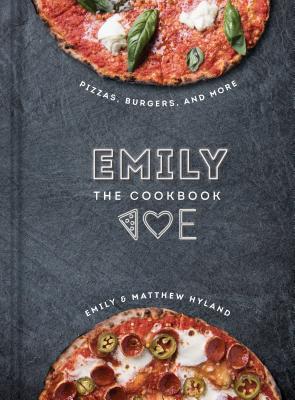
Emily: the cookbook by Emily and Matt Hyland
I really liked the authors of this cookbook and their restaurant philosophy. Emily and Matthew Hyland built the beginning of their relationship around pizza. After Matthew worked in several restaurants they decided to open up EMILY, a pizza restaurant. They've since expanded to two other locations and decided to create this cookbook as a way to share their food with a wider audience. While I liked their story and the ideas behind their food and restaurant, I just didn't find that many recipes I wanted to try. But, if you're wanting to expand your homemade pizza game this is one you should definitely check out.
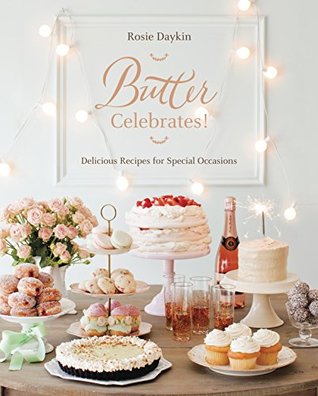
Butter Celebrates! by Rosie Daykin
Even if you don't make anything from this cookbook it's nice to just flip through and look at all the gorgeous desserts. Rosie Daykin opened Butter bakery in 2007 and she finds that when people order desserts from Butter she feels like she is part of whatever they are celebrating, hence the title of this cookbook Butter Celebrates!. The cookbook is organized by holiday since it is about celebrating, but many of the recipes could be used anytime. I also liked that in the introduction she gives tips on entertaining, important tools for baking, and other tips to make your home baking better. Overall, a good cookbook and there are definitely a few recipes I want to try out.
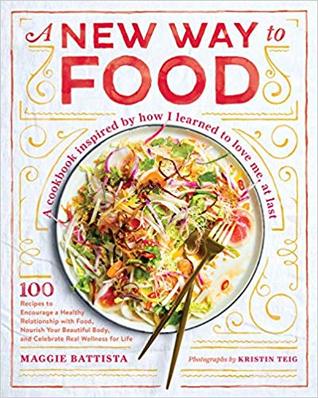
A New Way to Food by Maggie Battista
Maggie Battista grew up always being the heavier girl. Everyone always had a backhanded compliment like, "your face is so pretty" or "good thing you're so smart." Her parents would hide food from her, but that only served to teach her to hide food and sneak it when alone. Finally after many years of struggling with her weight she began to work toward truly loving herself and that led her to a healthier life overall - not just the goal of losing weight. In A New Way to Food Battista shares her struggles and gives recipes she used to eat healthier without giving up whole food groups or constantly depriving herself. I liked that she focused on just making steps toward being healthier, not before and after photos or insisting that her way is the right way. She shows what she did, but also encourages readers to find their own way or start where they can now. While this is definitely a cookbook there was a several page introduction to each section and I almost feel like this would have been better as more of a memoir with recipes included instead of a cookbook with long memoir-like sections. But, overall I like her approach and while I don't want to be vegetarian Battista is showing what worked for her. And there are a few recipes I'd like to try as well.

Food52 Genius Desserts
I've checked out some of the other Food52 cookbooks, so when I saw this one I all about desserts I was interested. There are some odd recipes like parsley cake that looks like you're eating a grass cake, but there are plenty of others that look amazing. I was surprised to see that the recipe on the cover for the gorgeous chocolate cake is a vegan recipe. The recipes in here really run the gamut of desserts from simpler cookies and bars to more complex cakes and pies. There is also a good introduction with tips for baking and "genius tools" that give info on tools that unexpectedly really help with baking. And throughout the book there are "genius tips" from how to crack eggshells more cleanly to "the most important rule in pie dough." Overall, a very thorough dessert cookbook from the well-established Food52.

The Prairie Homestead Cookbook by Jill Winger
I didn't realize when I put this book on hold at the library that Joel Salatin wrote the foreward - that's all the endorsement I need to know this is a great book! Jill Winger and her husband decided when they were first married to buy a farm in Wyoming and start homesteading. At the time Winger was learning through trial and error, but she wants to pass on the knowledge she learned, especially about cooking, on so others can benefit from what she learned. There is SO MUCH great information in this cookbook! And so many recipes I want to try that I will probably end up buying it. The first part is recipes and the second part is about growing your own ingredients from veggies to meat and milk. But, Winger reiterates that you don't have to live on a farm and raise livestock to homestead - you can still source high-quality, local food from farmers. In the second section she also gives a brief overview of canning, but as I always say if you want to learn to can take a class or learn in person from someone who's experienced - don't just go by a book. Overall, this is an AMAZING cookbook filled with all kinds of great recipes and homesteading tips.
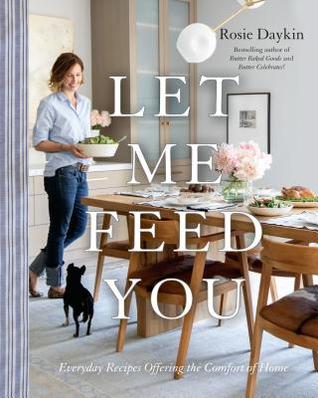
Let Me Feed You by Rosie Daykin
I just recently looked through one of Daykin's previous books, Butter Celebrates!, so I was excited to check this one out since it was a more traditional cookbook, not just desserts. Let Me Feed You is laid out like a tradition cookbook with chapters on breakfast, sandwiches, soups, salads, mains, vegetables, etc. and there were quite a few recipes I want to try. The only odd thing to me was before each section there was a one page article about some random thing in Daykin's life like her love of dishes or old dogs. While there is nothing wrong with these little articles they just didn't fit with the cookbook. If this were more of an overall home type book that included recipes it would work better, but it just seemed odd and kind of stuck out in the book. But, the recipes look great and there were a lot that I'd like to try.
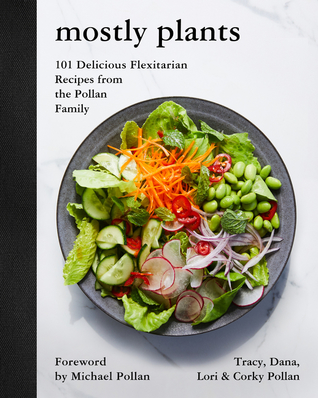
Mostly Plants by Tracy, Dana, Lori, and Corky Pollan
When Michael Pollan said in his book In Defense of Food, "Eat food, not too much, mostly plants." as his guide to healthy eating, he started a national conversation about food and what we should eat. This quote is also the inspiration for this cookbook created by his 3 sisters and his mother. While the Pollan family grew up eating the typical meat, starch, and veggie meals over time many of them moved into vegetarianism or flexitarianism. So, this cookbook is a way for them to share some of their favorite meals that can be made meat, dairy or gluten free easily. Michael Pollan writes the foreword and in the introduction the reader is introduced to each member of the Pollan family who contributed and their personal food journey and philosophy. While I'm not a vegetarian, I do buy all my meat from local farmers which is more expensive, so I do try to have some vegetarian meals just to stretch my food budget. There are definitely some recipes I want to try in here. Overall a good cookbook if you're looking to add more vegetable-centered meals to your table.
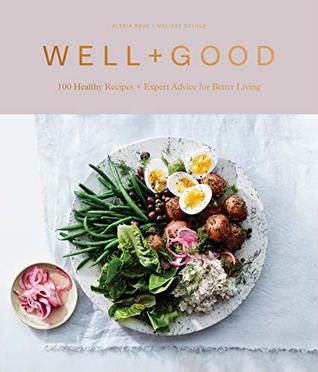
Well + Good Cookbook by Alexia Brue and Melisse Gelula
This is a cookbook for celebrities or ultra-wealthy people who have the time and money to source a bunch of random/exotic substitute ingredients (or have staff doing this for them). Every recipe is full of stuff like almond meal, arrowroot powder, baharat, etc. I personally believe that you can eat well with actual foods and not substitute every form of dairy or flour. I understand lots of people have food allergies/sensitivities, but this cookbook says it's for eating healthier, not for food allergies. When literally every single recipe had several substitutes I just lost interest. I'm not into spa food I'm into real, whole food. I'm not saying this is a bad cookbook, it's just not for me.
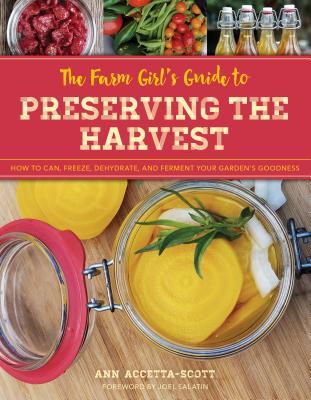
The Farm Girl's Guide to Preserving the Harvest by Ann Accetta-Scott
This is the second book in the last month that I've picked up only to realize Joel Salatin wrote the Foreword! Anything Joel Salatin endorses has got to be right up my alley. I put this title on hold because I'm always looking for new canning ideas or recipes. Ann Accetta-Scott does more than just give some canning recipes this is really a primer for preserving your own food. She covers several different ways to preserve food with lots of tips and tricks. She also goes into detail about why some foods need to be pressure canned vs. water bath canned - which is very important. While I did enjoy this book and got some new ideas, I always say that for canning food you need to take a class or learn from someone who is experienced. I would NOT recommend learning to can from a book. But, this is still a wonderful book for someone who's interested in preserving more of the food you grow or buy from your local farmer.
No comments:
Post a Comment